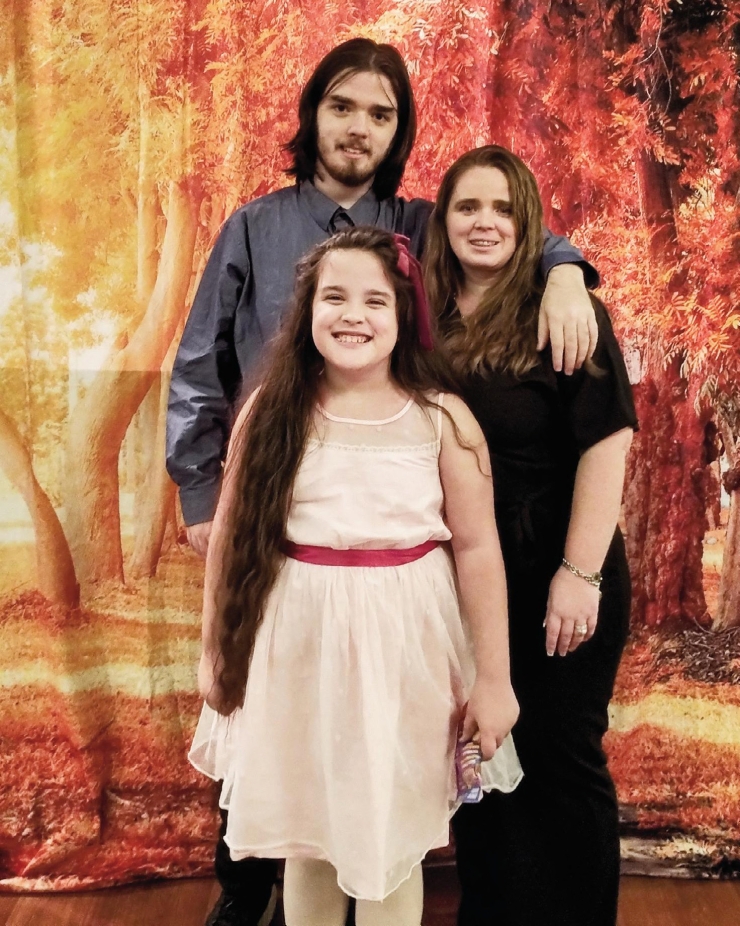
FALL FUN: Cindy Weber with Corie and Scarlett attend a autum dinner hosted by Corie's youth group;"Ideally, every family would have a village of support that they could draw on, but that's not always the case. Sometimes, we have to find and make our village."
Neurotypical children are able to learn quickly that it is safe, and what they need to do to have their teeth cleaned. For children with disabilities, this learning process typically requires repetition and perhaps multiple visits per year before they are able to allow dental staff the trust to clean their teeth. You can talk to your dentist about letting your children come in for more than just cleanings. For example: you might bring them in to just sit in the chair and get comfortable with the environment and equipment. For those who can't become comfortable, sedated dentistry may need to be an option to have their dental needs met. With multiple children with disabilities, dentist visits might need to be separate for each
child, and that means a lot more time away from potential working hours for the parent.
Frequently, parents need to balance routines between children that have a wide variation in their skills and abilities. Perhaps, one child can dress themselves independently and pack their own lunch, and the other child requires a higher level of prompting and assistance to complete the same tasks. It can be especially difficult to navigate when the child who requires the higher level of support is older. This is just one example of why it is so important to talk to your children about their disability, and teach them self-advocacy skills. It can also be worth reviewing your child's routine to see if an additional accommodation
might provide them with a higher level of independence. A child that needs a higher level of prompting and support to dress themselves in the morning may be more successful if their clothes are laid out the night before. A small change like this can make the routine smoother, helping both the child complete their daily activities in a more independent way, and the caregiver, by perhaps giving them a moment to help the other child or sit down and tend to their own needs.
For those raising more than one child with a disability, it’s not unheard of for the children or youths’ support needs to be very different. For example, one child may thrive in busy social events, another may prefer to be in a quieter setting. How can parents meet the needs of both children when they conflict? Ideally, every family would have a village of support that they could draw on, but that’s not always the case. Sometimes, we have to find and make our village. Parent support groups can be a good place to start. If you’re wondering where to start, or want to learn more about parent groups and their benefits, check out the Center for Parent Information and Resources for more information. Obtaining emotional and logistical support from a peer who has lived experience, and understands the struggles of raising children with exceptional needs can have an enormous positive effect on the mental health and empowerment of caregivers. They are also a helpful resource for school, community and state level programs that serve families of children with disabilities.
Families raising multiple children with disabilities are much more likely to experience higher levels of stress without support from family or community. "Parents of children with special educational needs experience high levels of parental stress". (Andrew W. Y. Cheng and Cynthia Y. Y. Lai, 2023) As the old saying goes, it takes a village to raise a child and the need for support is exponential for a parent with multiple children with disabilities. Parents need to coordinate doctor's appointments, medical procedures, therapies, school, and social events. Everyday outings to the store for immediate needs requires careful planning. Knowing the support available in your area can make a big difference in the outcomes for the family and provide a small sense of normalcy.